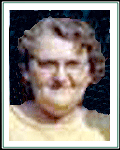|
 Recently I attended a meeting of Remembrance at
.St.
John's
Episcopal Church in
Charlotte.
When the invitation came a couple weeks before, my first
reaction was, “Well, la-de-da!" However, the more I thought
about it, the more curious I became. After all, it was being
sponsored by the Eaton Community Hospice, and I am deeply
indebted to them for the support we received, Chuck and I
and our family, the last 3 weeks of his life. I am so glad I
went. Recently I attended a meeting of Remembrance at
.St.
John's
Episcopal Church in
Charlotte.
When the invitation came a couple weeks before, my first
reaction was, “Well, la-de-da!" However, the more I thought
about it, the more curious I became. After all, it was being
sponsored by the Eaton Community Hospice, and I am deeply
indebted to them for the support we received, Chuck and I
and our family, the last 3 weeks of his life. I am so glad I
went.
Do you know what hospice stands for? The word has many
meanings. It can be a lodging or way station for weary
travelers. Centuries ago it was a place where sick and dying
wayfarers could go when no one else wanted to be bothered
with them.
The modern meaning of hospice is caring and helping at a
very traumatic and totally overwhelming time in anyone's
life. Imagine what it means to be told you or a dearly loved
one has possibly a year, or 6 months, or 3 weeks, to live.
What do you do? To whom do you turn?
Your family? Your friends?
Of course you do, but it is just as rough on them to
relate to the news as it is for it you and the one who is
dying.
You need, desperately, someone who is not so emotionally
involved, someone with personal experience and expert
training in coping with life at its most tragic, impossible
hours. You need an instant friend who will listen, and
listen, and keep on listening: who will let you know it IS
all right to breakdown and really cry (and maybe even
scream); to rail at life; to ask "God, why us?” to let all
the bitterness flow out.
You need someone to say, "You go for a long walk (or for
groceries or whatever); I'll stay here until you get back.”
While you are gone, the house is straightened, the dishes
done, the phone answered, the patient is bathed, the bed
changed, and he, also, is listened to and his worries and
concerns soothed. You are counseled in the little ways to
make those last days both easier and as comfortable as
humanly possible; that conversation is important even when
the words almost choke you, and often there is no response;
favorite music and TV programs are soothing. All the little
things at a time like this, there are no big ones anymore.
Caring does not stop at death, either. They follow along
during the mourning period to see that adjustment is
progressing, at your own speed, but progressing. They are
there to reassure you; to help you realize life does go on
however sure you are that it won't; that you must live out
your appointed life span, even if you would rather not right
now; and that it is OK to put on a brave front if that is
your way to cope, just as long as you cope
Don't be afraid to discuss Hospice with your doctor. Please
don't think you don't need it. We were among the very first
people aided by the Eaton Community Hospice. I wasn't at all
sure we needed them either, but we did, especially me.
Florence
Toburen, Onondaga
|

